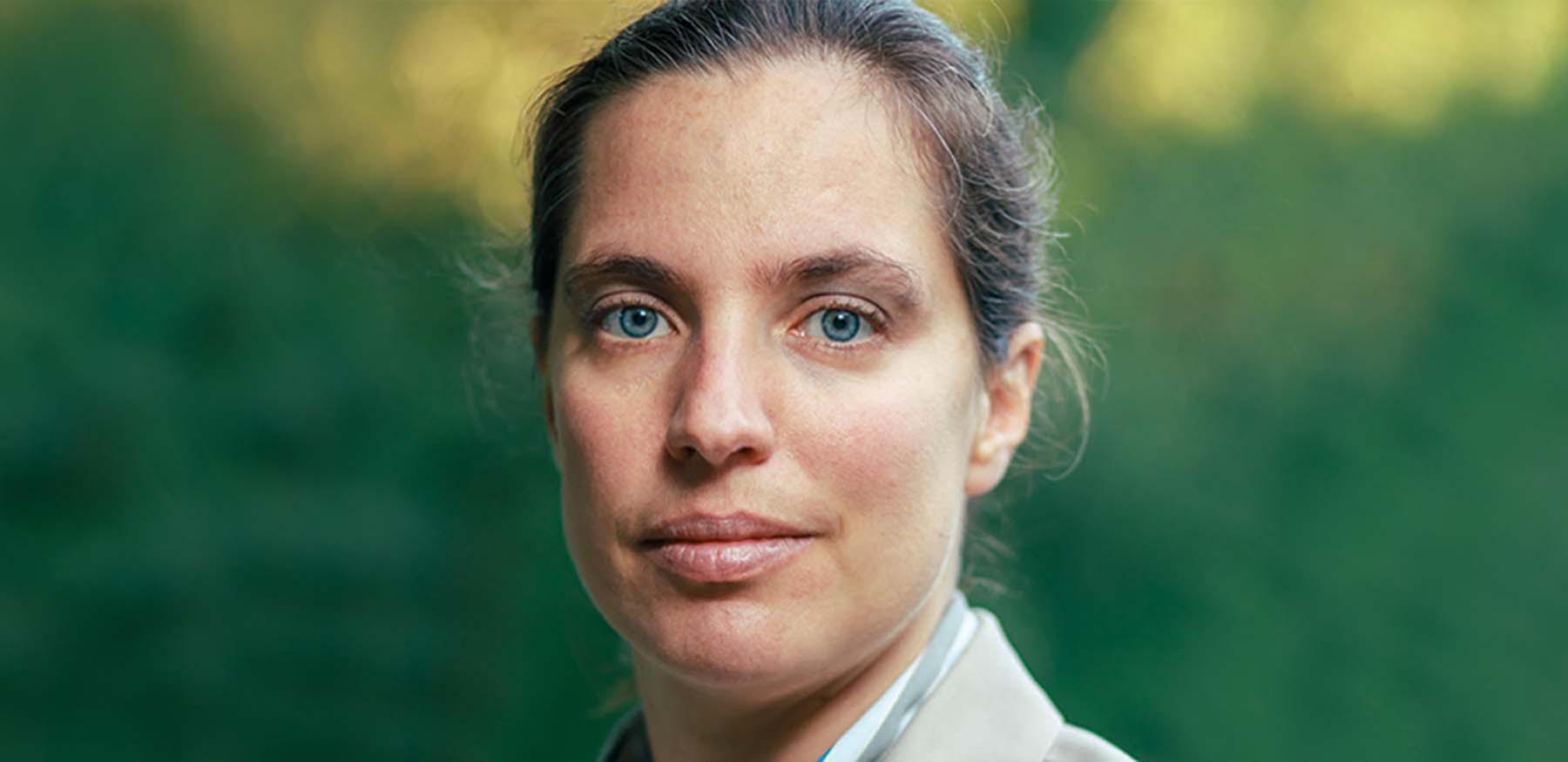Community - Students - Cara Sawyer Profile

Student Profile Cara Sawyer
Mastering Mediation
Cara Sawyer’s interests in environmental and international law overlapped at the InterNational Academy of Dispute Resolution’s World Mediation Congress, where she presented on behalf of Loyola.
Cara Sawyer says a passion for the environment informs everything she does
Cara Sawyer grew up on a hobby farm, tending to vegetables with her family, learning to live in sync with the land and the seasons. So today, she notices subtle changes in seasonal temperatures and migratory bird patterns—small shifts that point toward something larger.
As a fourth-year JD student at Loyola University Chicago School of Law, Sawyer says a passion for the environment informs everything she does—and she thinks climate change should be on everyone’s mind. “To me, it’s the universal problem affecting everything,” she says.
In 2021, Sawyer’s interests in environmental and international law overlapped at the InterNational Academy of Dispute Resolution’s World Mediation Congress. (This year’s theme: Using Mediation to Cool off a Heated Planet.) Sawyer hosted Loyola’s day, leading conversations with five of the six featured speakers. The conference showed the many international benefits of mediation outside of the classroom. “There’s a lot of theory that’s discussed, both in academia and as a legal practitioner,” she says. “This was very practical. Seeing mediation in practice like that was very heartening.”
One case involved a banana plantation in Malaysia that was constantly getting trampled by elephants. The plantation owners wanted the elephants gone; the indigenous people wanted wild land and the elephants protected. Mediation led to a tidy solution: The plantation donated undeveloped land to create corridors through the banana plants where elephants could travel without harming any crops. “It was a win-win,” Sawyer says. “The elephants got safe passage through the banana plantations, and the bananas weren’t being destroyed. The thoroughfares proved to be useful for everyone.”
“The idea is that we’re all being impacted, and maybe we can use our common concern of environmental issues to come together.”
Beyond the World Mediation Conference, Sawyer stays busy with other alternative dispute resolution opportunities at Loyola. In 2021, she was one of four students selected for the Vienna team of the Willem C. Vis Moot Competition, which focuses on international commercial arbitration.
Sawyer also is serving her second year as president of Loyola’s Environmental Law Society (ELS). In 2020, spurred by prolonged national civil unrest, she introduced a lecture series called The Social Impacts of Environmental Justice to create awareness of shared issues and goals. The monthly lectures were co-sponsored by the Latino Law Students Association, Black Law Students Association, and Asian Pacific American Law Students Association. This year, the ELS hopes to collaborate with more conservative students to continue the conversation. “The idea is that we’re all being impacted, and maybe we can use our common concern of environmental issues to come together,” she says. –Megan Kirby (January 2022)
Cara Sawyer says a passion for the environment informs everything she does
Cara Sawyer grew up on a hobby farm, tending to vegetables with her family, learning to live in sync with the land and the seasons. So today, she notices subtle changes in seasonal temperatures and migratory bird patterns—small shifts that point toward something larger.
As a fourth-year JD student at Loyola University Chicago School of Law, Sawyer says a passion for the environment informs everything she does—and she thinks climate change should be on everyone’s mind. “To me, it’s the universal problem affecting everything,” she says.
In 2021, Sawyer’s interests in environmental and international law overlapped at the InterNational Academy of Dispute Resolution’s World Mediation Congress. (This year’s theme: Using Mediation to Cool off a Heated Planet.) Sawyer hosted Loyola’s day, leading conversations with five of the six featured speakers. The conference showed the many international benefits of mediation outside of the classroom. “There’s a lot of theory that’s discussed, both in academia and as a legal practitioner,” she says. “This was very practical. Seeing mediation in practice like that was very heartening.”
One case involved a banana plantation in Malaysia that was constantly getting trampled by elephants. The plantation owners wanted the elephants gone; the indigenous people wanted wild land and the elephants protected. Mediation led to a tidy solution: The plantation donated undeveloped land to create corridors through the banana plants where elephants could travel without harming any crops. “It was a win-win,” Sawyer says. “The elephants got safe passage through the banana plantations, and the bananas weren’t being destroyed. The thoroughfares proved to be useful for everyone.”
“The idea is that we’re all being impacted, and maybe we can use our common concern of environmental issues to come together.”
Beyond the World Mediation Conference, Sawyer stays busy with other alternative dispute resolution opportunities at Loyola. In 2021, she was one of four students selected for the Vienna team of the Willem C. Vis Moot Competition, which focuses on international commercial arbitration.
Sawyer also is serving her second year as president of Loyola’s Environmental Law Society (ELS). In 2020, spurred by prolonged national civil unrest, she introduced a lecture series called The Social Impacts of Environmental Justice to create awareness of shared issues and goals. The monthly lectures were co-sponsored by the Latino Law Students Association, Black Law Students Association, and Asian Pacific American Law Students Association. This year, the ELS hopes to collaborate with more conservative students to continue the conversation. “The idea is that we’re all being impacted, and maybe we can use our common concern of environmental issues to come together,” she says. –Megan Kirby (January 2022)
